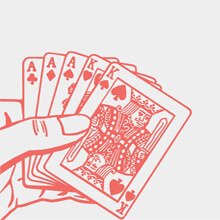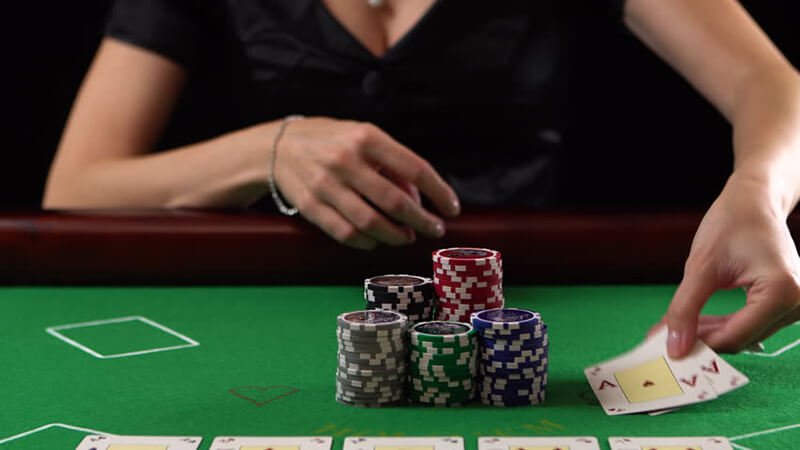
Poker Tournaments Online
- In multi-table tournaments, usually the top 10% make it on to win money
- Single table tournaments are known as Sit ‘n Go
- Most online poker tournaments are Freeze-Outs
All players start any live poker tournaments online with exactly the same amount of chips. Then as the tournament progresses, the blinds and/or antes steadily increase over time. This is done to force the action and speed up the pace of the poker tournament online. Everybody keeps on playing until they either lose all of their chips, at which point they are busted out of the poker tournament online, or outlast all the other players to become the champion of the tournament. Within this simple framework there can be many variations: multi-table or single-table, freeze-out or re-buy, regular or satellite.
A multi-table poker tournament online is exactly what it sounds like, a large tournament with many tables full of players. Since tournament prize pools are comprised of all the cumulative buy-ins of all the players (minus a fee the casino charges for hosting the tournament), it follows that the more numerous the players, the larger the prize pool. This is the first reason why multi-table tournaments offer the greatest potential profit. The other reason is that multi-table poker tournaments online are full of bad poker players who have no real idea how to play well, and no feasible chance to win. These players are habitually referred to as “dead money.” In a multi-table tournament, usually the top 10% of players make it into the money, which works out to be one player per table. But the lion’s share of the prize money is awarded to those players who make it to the final table, particularly the final three.
Single-table poker tournaments online operate on very similar principles except that they are, of course, limited to one table from the start. One-table tournaments are extremely common online, where they are referred to as “sit-n-go” tourneys. In a brick & mortar card-room, a single-table tourney is more likely to be what’s called a satellite. Single-table poker tournaments online are also less likely to be scheduled ahead of time, they usually just begin whenever the table fills up with enough players. In these types of tournaments, knowing how to play well shorthanded is paramount.
The majority of poker tournaments online are played as freeze-outs. In a freeze-out tourney, once a player loses all their chips, that’s it, finito. That player is out of the tournament. In contrast, there are also rebuy tournaments. In such a tournament, when a player loses his or her chips (or simply falls below a certain level), that player can buy more chips at any time during the rebuy period. This rebuy period generally lasts for about the first hour or so, during which time a player may be allowed to make unlimited rebuys, or be restricted to only a specific number. At the end of the rebuy period, players are offered the chance to make an “add-on,” which is essentially a final rebuy. Add-ons differ slightly in that a player may purchase them regardless of how many chips he or she has left. Once the rebuy period is over, the tournament continues as a standard freeze-out.
In addition to regular tournaments, there are also special tourneys known as satellites. A satellite is a tournament where the prize for the winner is not money, but entry into a larger, more expensive tournament. Many satellites are single-table events, with only the first-place finisher receiving an entry. But satellites can also be multi-table affairs, awarding multiple players. Satellites to the big-deal megatournaments such as The World Series of Poker tend to be quite large, and these are known as supersatellites.

Land Based and Online Poker Tournaments
Some casinos also host tournaments known as shootouts. A shootout tournament is a rather unique combination of the single-table and multi-table formats. It works like this: a shootout begins the same way as any other multi-table tourney. But as players get knocked out, the tables are not consolidated. All the players must keep playing at their original table until only one player remains. The winners of each table then go on to play each other in the next round. There are double shootout tournaments, where a player must win two tables to become the champion, and triple shootouts, where the player must win three tables in three playoff rounds. As with regular multi-table poker tournaments online, everybody who makes the final table will be rewarded.
Buy-ins for any given tournament can range from nothing for a freeroll tournament (however, players must usually qualify for this free entry by playing poker a certain number of hours in the chosen casino), to many thousands of dollars for the most famous events. Many casinos do offer fairly cheap poker tourneys on a regular basis, with buy-ins as low as $10 or so. These types of tournaments can be great way for new poker players to get cheap playing experience.
Once you buy into a tourney, you will be assigned to a particular seat. If you are playing a flop-type game such as Texas Hold’em or Omaha (and the vast majority of poker tournaments these days are played as No-Limit Hold’em events), players will usually draw cards for the button. In the early stages of a tourney, the blinds and antes will be relatively low, and so in this phase the strategy is similar to that for a regular cash game. The main goal at this point is survival, simply to make it to the later rounds.
One important difference between a tournament and a cash game is that you cannot walk away from the table and take a break whenever you please. Well actually you can, but if you do this you are still technically playing in the tournament, so your blinds and antes will be posted in your absence. All multi-table tournaments schedule regular breaks for the players.
As the tourney progresses, the blinds and antes will continue to escalate. And with them, the stakes. At a certain point in the tournament, you will probably be required to colour up. That is, to exchange all your chips for chips of a larger denomination. If there are any extra small chips leftover after the colour up, these are taken care of in one of two ways. Some tournaments simply round up the leftover amount in your favour, and so for example you would receive a $100 chip for one, two, or three $25 chips. Other tournaments will have the players “race” for the leftover chips. In this case, all the leftover chips are collected by the dealer and coloured up, and then each of the players who contributed those chips draw cards, with the highest card(s) winning the extra chips.
If there are any disputes at all during the course of the tourney – about the play of a hand, a payout, or anything at all for that matter – it is the job of the tournament director to settle the dispute. The tournament director’s word is always final in these matters. This is probably also a good place to mention that if any tournament player breaks the rules or becomes disruptive in any way, that player can be given a “time-out,” a forced leave of absence from the tourney during which that player’s blinds and antes will still be posted. And in very serious cases a player can even be expelled from the tournament, with no refund of the buy-in fees.
As you get into the later stages of a poker tournament online, the situation changes considerably. More and more players will be getting knocked out, making the games shorthanded. In a multi-table tourney, players will get moved from one table to another, as the tables are broken down and consolidated. This is also the phase where optimum strategy begins to change substantially. Unless you have the good fortune to be one of the chip leaders, the ever-increasing blinds will begin to eat away at your stack. This means you will likely be playing for all your chips, sooner or later, whether you want to or not. Thus, as the blinds get bigger and bigger, players are compelled to loosen up and play more and more hands.
At this stage of the competition it is critical for you to constantly be aware of your opponents’ chip stacks, and how large or small they are relative to your own. Knowing who can bust you out in a single hand, or who you can bust out, is vital. In the final stages of a tournament, the psychology of the game and the ability to “play the player” becomes much more important. Now it becomes very easy for one wrong move to bust you out of the tourney. And as you begin to get close to making it into the money, this takes on a special significance. Conventional wisdom holds that the absolute worst place to finish in any tournament is just one or two places off the money, or “on the bubble” as it is called. So typically at this point in the tourney, the short stacks tighten up and play conservatively, just trying to sneak into the money, and the big stacks will take advantage by becoming more aggressive.
The real money is always made at the final table. If you should make it this far, you are guaranteed to make a profit. Occasionally it will happen that once the tourney gets down to the last few players, some of these players will offer to “cut a deal.” That is, they will agree to divide the remaining prize money amongst themselves, rather than playing out the rest of the tourney. Deciding how to divide up the prize money in a deal is the tricky part. The main factors taken into consideration are the size of each player’s chip stack, and the perceived skill level of each remaining player. Some poker players prefer never to cut a tournament deal, and in fact some tournaments forbid them. If that’s the case the final players simply have to duke it out until there is a winner.